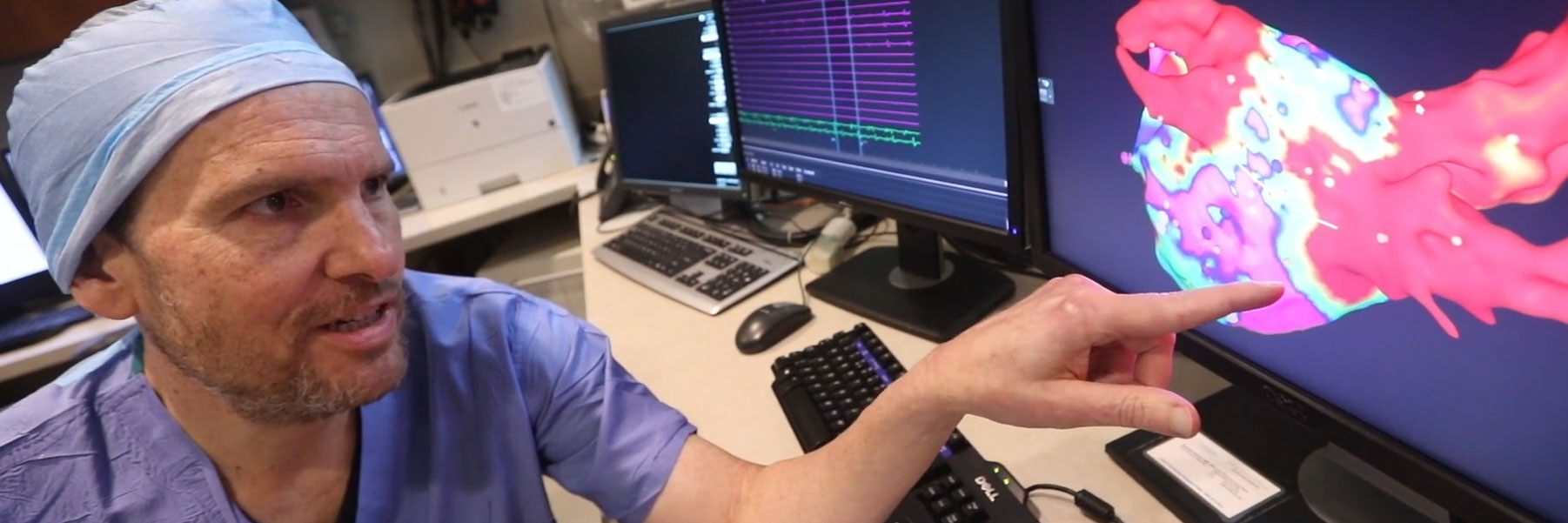Landmark Study Proves Ablation is Effective Alternative to AFib Drugs

About 33 million people worldwide have atrial fibrillation, the most common type of heart rhythm disorder or arrhythmia, and a condition that can lead to stroke or death.
Until recently, patients were mainly treated with antiarrhythmic drugs but they were not very effective. Now, a landmark study has helped prove that catheter ablation is a safe, effective alternative to medication for treating atrial fibrillation (AFib). In fact, ablation outperformed medication in the patients who underwent the procedure versus those who were treated with medication.
The University of Miami Health System was one of the participants in the multi-center international study, Catheter Ablation versus Antiarrhythmic Drugs for Atrial Fibrillation (CABANA), which was the largest, most comprehensive trial of its kind.
“The University of Miami Health System was the only South Florida site chosen to conduct CABANA because we were recognized as a regional leader in AFib treatment and research,” said Dr. Jeffrey Goldberger, chief cardiovascular physician at UHealth.
What is catheter ablation?
During ablation, a long, flexible catheter tube is threaded up through veins from the leg into the heart. The electrophysiologist then modifies abnormal heart tissues that trigger the arrhythmia, thereby normalizing the heart rhythm. This nonsurgical method isn’t new, but until CABANA, the medical community wasn’t convinced it was any more effective than medication.
“Rhythm control drugs are effective less than 50 percent of the time,” said Dr. Raul Mitrani, director of clinical cardiac electrophysiology. “The CABANA study allows us to evaluate patients more carefully and to discuss the pros and cons of catheter ablation. It also confirms other studies that have shown quality of life improvement for patients with AFib. However, the CABANA study went further and showed decrease in cardiac hospitalizations, and even improved survival in some patients.
The study has shown a beneficial role for catheter ablation for many patients who experience atrial fibrillation. After tracking 1,096 drug therapy patients and 1,108 ablation patients for about four years, researchers found that:
- Ablation reduced mortality or cardiovascular hospitalizations by 17 percent, compared to drug therapy.
- Ablation reduced the first recurrence of AFib by 47 percent.
- In some subsets of patients, ablation even reduced the combined endpoint of death, stroke, cardiac arrest or serious bleeding by 27 percent.
Dr. Douglas Packer, the study’s principal investigator and a cardiologist at Mayo Clinic, said, “CABANA provides the evidence we have been looking for in the effectiveness and safety of catheter ablation when compared to drug therapy. The data from this trial has the potential to guide treatment of atrial fibrillation for years to come.”
Nancy Moreland is a contributing writer for the UMiami Health News blog. She has written for several major health care systems and the Centers for Disease Control and Prevention. Her writing also appears in the Chicago Tribune.
Tags: ablation, Afib, atrial fibrillation, Catheter Ablation versus Antiarrhythmic Drugs for Atrial Fibrillation, Dr. Raul Mitrani
